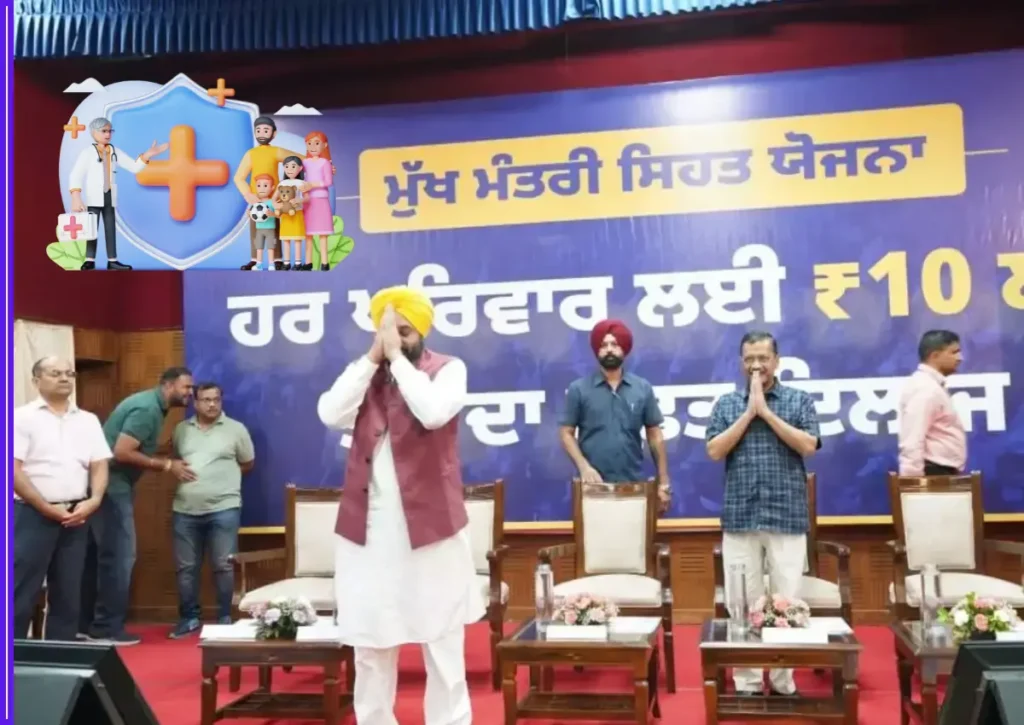Chandigarh, In a landmark move, the Punjab government has approved a ₹10 lakh universal health insurance scheme that will cover every family in the state. Chief Minister Bhagwant Mann made the announcement earlier this week, stating that the scheme will be implemented from October 2, 2025, and will offer cashless treatment of up to ₹10 lakh per family per year.
With this, Punjab becomes the first Indian state to provide such comprehensive health insurance coverage to its entire population, regardless of income level, occupation, or existing health condition.

Full Coverage for All 65 Lakh Families
Currently, around 45 lakh families in Punjab are covered under existing central and state schemes such as Ayushman Bharat and the Mukh Mantri Sarbat Sehat Bima Yojana. Under these, families were entitled to ₹5 lakh of health coverage per year. With the new initiative, the government will expand the scheme to cover all 65 lakh families in the state and double the insurance amount.
“There will be no economic or social eligibility criteria. Every household in Punjab will get ₹10 lakh in health insurance benefits annually,” said CM Mann during the official announcement. He added that this step was necessary to ensure that no person in Punjab is denied treatment due to a lack of money.
Free Treatment in Govt & Private Hospitals
The coverage will include free treatment at all government hospitals as well as a large network of empanelled private hospitals across Punjab and other states. The treatment will be completely cashless. Beneficiaries will be able to access services by presenting a Sehat Card, which will be issued at no cost.
According to officials, over 550 private hospitals have already been empanelled under the scheme. The state is planning to expand this network to at least 1,000 hospitals before the rollout.
The insurance policy will cover treatments for a wide range of health issues, including surgeries, cancer care, dialysis, maternity services, emergency care, and critical illness. All treatment packages will follow standardized pricing to ensure transparency and avoid overbilling.
Sehat Card Distribution
Beneficiaries will receive Sehat Cards, which will serve as proof of eligibility. Cards can be obtained free of charge from Seva Kendras, Common Service Centres (CSCs), or downloaded online using Aadhaar or voter ID.
The government has also stated that there will be no family size limit. Whether a household has two or ten members, the full ₹10 lakh cover will apply. The policy will also include portability, meaning beneficiaries traveling outside Punjab can avail treatment from Ayushman Bharat empanelled hospitals across the country.
Budget and Implementation
To support this massive initiative, the Punjab government has allocated ₹778 crore in its 2025–26 budget. Officials stated that the funds will be used not just for insurance premiums, but also to strengthen IT systems, support hospital onboarding, and manage claim settlements efficiently.
The policy is being implemented under the banner of an expanded Mukh Mantri Sarbat Sehat Bima Yojana, and will be run in collaboration with insurance providers and a third-party administrator to process claims.
The system will use real-time online verification for patients. Hospitals can check eligibility instantly and process admission without the need for advance payments or documentation delays.
Political Standpoint
Chief Minister Mann said the decision was based on the government’s commitment to prioritizing people’s health over politics. “Previous governments used public health only for slogans. We’re turning that promise into reality,” he said, taking a swipe at rival parties during the launch event.
He emphasized that the scheme was not a welfare expense, but an investment in Punjab’s future. “Healthy citizens build a stronger Punjab,” he added.
Mixed Reactions from Hospitals
While the announcement has been welcomed by most healthcare experts and patients’ groups, some private hospitals have expressed concern over delays in reimbursements and pricing under previous schemes. They have urged the government to streamline the process and ensure fair rates are set for all procedures.
Hospital administrators in cities like Amritsar and Ludhiana said they would participate in the scheme but expected clarity on payment timelines and settlement processes.
“We support the scheme, but the government must ensure that hospitals are paid on time and packages are reviewed based on cost structures,” said a private hospital owner in Amritsar.
What’s Covered Under the Scheme?
The policy will cover a wide array of treatments, including:
- Hospitalization and surgeries (general and specialty)
- Critical illnesses like cancer, heart disease, and kidney failure
- Maternity care and newborn health
- Diagnostics and post-hospitalization follow-up
- Emergency care, trauma, and accident cases
- Dialysis and other chronic care needs
There will be no restriction on pre-existing conditions. All residents will be eligible regardless of age or medical history. The policy does not require any premium to be paid by the families.
National Impact
Healthcare experts believe that Punjab’s move could prompt other Indian states to explore similar universal coverage models. While Ayushman Bharat covers about 40% of India’s population, Punjab’s plan extends to 100% of families, setting a new benchmark for state-level health security.
The policy also aligns with global public health goals to reduce out-of-pocket medical expenses, which remain a major cause of financial hardship in India.
Rollout Timeline
- Sehat Card distribution: Begins August–September 2025
- Empanelment of additional hospitals: Ongoing
- Official rollout date: October 2, 2025
The government is expected to issue formal guidelines, a full list of empanelled hospitals, and helpdesk support details in the coming weeks.









